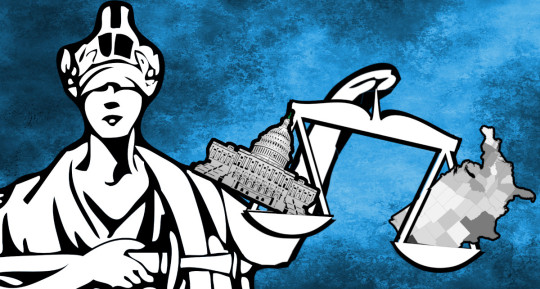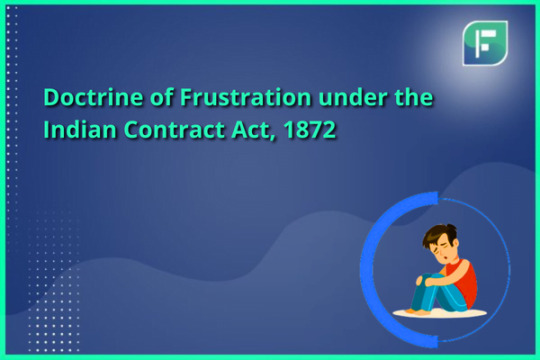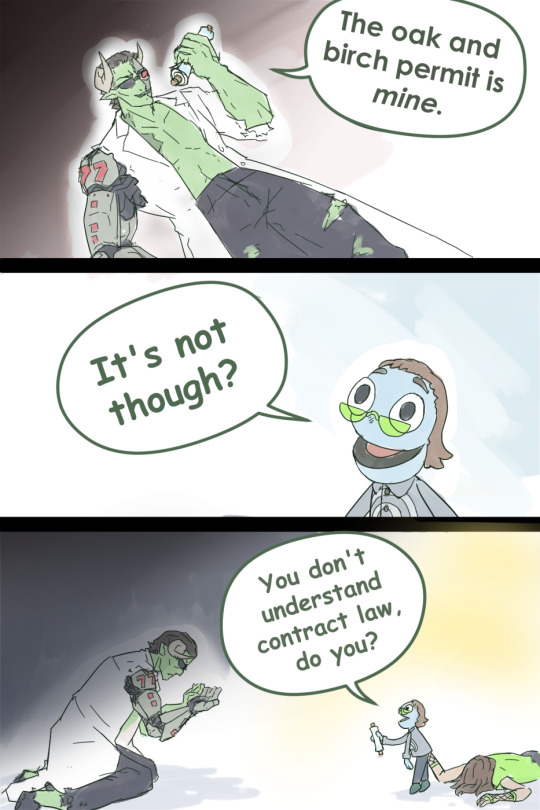#contract law
Text
The Empire counters...
#public domain#copyright#bill willingham#authors rights#contract law#intellectual property#comic books
53 notes
·
View notes
Text
Fighting the privacy wars, state by state

In 2021, Apple updated its mobile OS so that users could opt out of app tracking with one click. More than 96% opted out, costing Facebook $10b in one year. The kicker? Even if you opted out, Apple continued to spy on you, just as invasively as Facebook had, as part of its competing targeted ad product:
https://pluralistic.net/2022/11/14/luxury-surveillance/#liar-liar
If you’d like an essay-formatted version of this post to read or share, here’s a link to it on pluralistic.net, my surveillance-free, ad-free, tracker-free blog:
https://pluralistic.net/2023/02/23/state-of-play/#patchwork
The fact that Apple — a company that has blanketed the world with anti-surveillance billboards — engaged in deceptive, pervasive surveillance reveals the bankruptcy of “letting the market decide” what privacy protections you should have.
When you walk into a grocery store, you know that the FDA is on the job, making sure that the food you buy doesn’t kill you — but no one stops the grocery store from tracking literally every step you take, every eye movement you make (no, really!) and selling that to all comers:
https://themarkup.org/privacy/2023/02/16/forget-milk-and-eggs-supermarkets-are-having-a-fire-sale-on-data-about-you
America’s decision to let the private sector self-regulate commercial surveillance is a grotesque failure of duty on the part of Congress, which has consistently failed to pass comprehensive privacy legislation. There are lots of reasons for this, but the most important is that American cops and spies are totally reliant on commercial surveillance brokers, and they fight like hell against any privacy legislation:
https://pluralistic.net/2021/04/13/public-interest-pharma/#axciom
The private sector’s unregulated privacy free-for-all means that cops don’t need to get warrants to spy on you — they can just buy the data on the open market for pennies:
https://pluralistic.net/2020/08/18/fifth-pig/#ppp
The last Congressional session almost passed a halfway decent (but still deeply flawed) federal privacy law, but then they didn’t. Basically, Congress only passes laws that can be sandwiched into 1,000-page must-pass bills and most of the good stuff that gets through only does so because some bought-and-paid-for Congressjerks are too busy complaining about “woke librarians” to read the bills before they come up for a vote.
The catastrophic failure to protect Americans’ privacy has sent human rights groups hunting for other means to accomplish the same end. On the federal level, there’s the newly reinvigorated FTC, under the visionary, muscular leadership of Lina Khan, the best Commission chair in a generation. She’s hard at work on rules to limit commercial surveillance:
https://pluralistic.net/2022/08/12/regulatory-uncapture/#conscious-uncoupling
But FTC regs take time to pass, and it can be hard for ordinary individuals to trigger their enforcement, which might leave you at the mercy of your local officials when your privacy is invaded. What we really need is a privacy law with a “private right of action” — the right to go to court on your own:
https://www.eff.org/deeplinks/2019/01/you-should-have-right-sue-companies-violate-your-privacy
The business lobby hates private right of action, and they trick low-information voters into opposing them with lies about “ambulance chasers” who sue innocent fast-food outlets for millions because they serve coffee that’s too hot:
https://pluralistic.net/2022/06/12/hot-coffee/#mcgeico
With Congress deadlocked and privacy harms spiraling, pro-privacy groups have turned to the states, as Alfred Ng writes for Politico:
https://www.politico.com/news/2023/02/22/statehouses-privacy-law-cybersecurity-00083775
The best provisions of the failed federal privacy law have been introduced as state legislation in Massachusetts and Illinois, and there are amendments to Indiana’s existing state privacy law — 16 states in all are working on or have some kind of privacy law. This means businesses must live with the dread “patchwork of laws,” which serves the business lobby right: they must do business in potentially radically different ways in different states, and small missteps could cost them millions, in true fuck-around-and-find-out fashion.
As Ng writes, these laws don’t have to pass in every state. America’s historically contingent, lopsided state lines mean that some states are so populous that whatever rules they pass end up going nationwide (the ACLU’s Kade Crockford uses the example of California Prop 65 warnings showing up on canned goods in NY).
As Congress descends further into self-parody, the temptation to treat the federal government as damage and route around it only mounts. It’s a powerful, but imperfect strategy. On the negative side, it takes a lot of resources to introduce legislation into multiple states, and to win legislative fights in each.
Think of the incredible fuckery that the coalition of Apple, John Deere, Wahl, and other monopolists got up to defeat dozens of state Right to Repair laws, even snatching victory from the jaws of defeat in New York state, neutering the incredible state electronics repair law before it reached the governor’s desk:
https://www.techdirt.com/2023/02/17/more-details-on-how-tech-lobbyists-lobotomized-nys-right-to-repair-law-with-governor-kathy-hochuls-help/
Indeed, the business lobby loves lobbying statehouses, treating them as the Feds’ farm-leagues, filled with naive, easily hoodwinked rubes. Organizations like ALEC use their endless corporate funding to get state legislation that piles farce upon tragedy, like the laws banning municipal fiber networks:
https://pluralistic.net/2022/12/15/useful-idiotsuseful-idiots/#unrequited-love
The right has always had hooks in state legislatures, but they really opened up the sluice gates in the runup to the 2010 census, when a GOP strategist called Thomas Hofeller started pitching Republican operatives on a plan called REDMAP, to capture state legislatures in time for a post-2010 census mass-redistricting that would neutralize the votes of Black and brown people and deliver permanent rule by an openly white nationalist Republican party that could lose every popular vote and still hold power.
Of course, that’s not how they talked about it in public. Though the racial dimension of GOP gerrymandering were visible to anyone on the ground, Hofeller maintained a veneer of plausible deniability on the new REDMAP districts, leaving the racist intent of GOP redistricting as a he-said/she-said matter of conjecture:
https://www.klfy.com/national/late-gop-redistricting-gurus-files-hint-at-partisan-motives/
That is, until 2018, when Satan summoned Hofeller back to hell, leaving his personal effects in the hands of his estranged anarchist daughter, Stephanie, who dumped all her old man’s files online, including the powerpoint slides he delivered to his GOP colleagues where he basically said, “Hey kids, let’s do an illegal racism!”
https://www.vice.com/en/article/pked4v/the-anarchist-daughter-of-the-gops-gerrymandering-mastermind-just-dumped-all-his-maps-and-files-on-google-drive
Sometimes, laws that turn on intent are difficult to enforce because they require knowledge of the accused’s state of mind. But there are so many would-be supervillains who just can’t stop themselves from monologing, and worse, putting it in writing.
As bad as state politics can be, they’re still winnable battlefields. Last year saw a profound win on Right to Repair in Colorado, where a wheelchair repair bill, HB22–1031, made history:
https://www.eff.org/deeplinks/2022/06/when-drm-comes-your-wheelchair
That win helped inspire Rebecca Giblin and I when we were writing Chokepoint Capitalism, our book about how Big Tech and Big Content rip off creative workers, and what to do about it.
https://chokepointcapitalism.com
Many readers have noted that the first half of the book — where were unpack the scams of streaming, news advertising, ebooks and audiobooks, and other creative fields — is incredibly enraging.
But if you find yourself struggling to concentrate on the book because of a persistent, high-pitched whining noise that you suspect might be a rage-induced incipient aneurysm, keep reading! The second half of the book is full of detailed, shovel-ready policy proposals to get artists paid, including a state legislative proposal that works from the same playbook as these state privacy laws.
If your creative work entitles you to receive royalties, your contract will typically include the right to audit your royalty statements. If you do audit your royalties, you will often find “discrepancies.” We cite one LA firm that has performed tens of thousands of record contract audits over decades, and in every instance except one, the errors they discovered were in the labels’ favor.
This is a hell of a head-scratcher. I can only assume that some kind of extremely vexing, highly localized probability storm has taken up permanent residence over the Big Three labels’ accounting departments, making life hell for their CPAs, and my heart goes out to them.
Anyway: if you find one of these errors and you tell your label or publisher or studio, “Hey, you stole my money, cough up!” they will pat you on the head and say, “Oh, you artists are adorable but you can’t do math. You’re mistaken, we don’t owe you anything. But because we’re good natured slobs, we’ll offer you, say, half of what you think we owe you, which is good, because you can’t afford to sue us. And all you need to do to get that money is to sign this non-disclosure agreement, meaning you can’t tell anyone else about the money we’re stealing from them.
“Oh, and one more thing: your accountant has to promise never to audit us again.” As Caldwell-Kelly said when we talked about this on Trashfuture, this is like the accused murderer telling the forensics team, “Dig anywhere you’d like in my garden, just not in that corner, I’m very sentimental about it.”
https://trashfuturepodcast.podbean.com/e/amazon-billing-amazon-for-amazon-feat-cory-doctorow-and-rebecca-giblin/
Now, contracts are a matter of state law, and nearly every entertainment industry contract is signed in one of four jurisdictions: NY, CA, TN (Nashville), and WA (games companies and Amazon). If we amended the state laws in one or more of these to say, “NDAs can’t be enforced when they pertain to wage theft arising from omissions or misstatements on royalties,” we could pour money into the pockets of creative workers all over the world.
Yes, the entertainment giants will fight like hell against this, and yes, they have a lot of juice in their state legislatures. But they’re also incredibly greedy and reckless, and prone to such breathtaking and brazen acts of wage theft that they lurch from crisis to crisis, and at each of these crises, there is a space to pass a law to address these very public failings.
For example, in 2022, the Writers Guild of America — one of the best, most principled, most solidaristic and unified unions in Hollywood — wrested $42 million from Netflix, which the company had stolen from its writers:
https://variety.com/2022/film/news/wga-wins-42-million-arbitration-netflix-1235333822/
Netflix isn’t alone in these massive acts of wage theft, and this is certainly not the only way Netflix is stealing from creative workers. There’s never just one ant: if Netflix cooked the books for writers, they’re definitely cooking it for other workers. That means there will be more scandals, and when they break, we can demand more than a bandaid fix for one crime — we can demand modest-but-critical legislative action to fix contracts and prevent this kind of wage-theft in the future.
The state legislatures aren’t an intrinsically better battlefield for just fights, but they are an alternative to Congress, and there is space to make things happen in just some of the 50 state houses that can ripple out over the whole country — for good and bad.
[Image ID: Blind justice, holding aloft a set of unbalanced scales; in the lower scale is a map of the USA showing the state lines; in the higher scale rests the capitol building.]
#pluralistic#states rights#laboratories of democracy#privacy#gdpr#federalism#contract law#chokepoint capitalism#wage theft#redmap
66 notes
·
View notes
Note
That alarrytale blog goes into another dimension of obsession and delusion. She goes on and on about unbreakable contracts reaching into infinity, without ever pausing to think what a contract is. A contract is only of any use to either side if there are consequences in law if it is broken without agreement.
Does she honestly think a large corporation could take someone to court on the basis that ‘ We want these gay people to appear straight and will thwart their careers if they admit to not being straight or to being in a relationship with each other. ‘ You can’t legally enforce a contract that is against the law, that is a nonsense. Presumably these early yet lingering ‘ contracts’ that she is so sure of were written in the UK - under the UK Equality Act 2010 you cannot discriminate on the basis of sexual orientation including heterosexuality . Can’t see it flying in the US system either.
Business and employment contacts can include behaviour clauses, such as those causing the company to be brought into disrepute, but these are for gross misconduct, illegal acts, extreme behaviour safety and safeguarding, inability or reluctance to perform.
There are certainly going to be expectations from management that performers abide by in their early days and then chafe against and that is what causes a lot of band breakups or change of management - but the idea that very wealthy adult men are still under some extreme micro control about their personal life is bizarre. Maybe she is getting mixed up with the very different subject of recording and music publishing rights.
And the babygate nonsense about a corporation knowingly planning and involving a child in some kind of paternity fraud - as if the corporate lawyers would let even a sniff of that pass.
100%. All corporate contracts are run past lawyers and anything to do with suppression of sexuality would be thrown out.
#👏👏👏👏👏#this is really articulate#babygate#is larry real#sony#contract law#x factor contracts#harry styles#louis tomlinson#liam payne#zayn#niall horan#one direction#1d reunion#larries#larry stylinson#larry
7 notes
·
View notes
Text
Someone good at contracts pls help 😭 If a contract is already valid, will the consideration given by someone else for said contract's validity (like pls make it valid I'll give you this book for it-but it already Is valid but they don't know it's valid). Be valid?
13 notes
·
View notes
Text
turns out you can burn the everliving fuck out of eggs
#fried eggs?#more like eggs I sent to the fucking ninth circle#I'm so sad#about the eggs#I'm very happy about the presentation I was working on that had distracted me from the egg cooking process#I think it went well#contract law#cooking
4 notes
·
View notes
Text
She perform contractual obligations until I unilaterally discharge
5 notes
·
View notes
Text
“Ariel signed the contract of her own free will, she wasn’t tricked or anything so Ursula literally didn’t do anything wrong” AU CONTRAIRE MON IGNORANT FRERE Ursula is knowingly contracting with a minor meaning Ariel may void the contract at any time under american law BUT MOST IMPORTANTLY and this goes for most any nation’s laws - *deep breath* - YOU CANT COLLECT ON A CONTRACT BREACH THROUGH SABOTAGE JFC if you purposefully prevent the party from fulfilling their contract obligations then they have not breached and you cannot collect a remedy
#the little mermaid#Ariel#Ursula#contract law#us law#Disney#why do people wanna blame this girl so bad we are not smart at 16
7 notes
·
View notes
Text
Elon Musk's Twitter takes a page out of WotC-Hasbro's playbook: Changing a long standing policy that a thriving third-party development community built itself around without warning, immediately sowing chaos in the lives of the people to whom twitter owes much of it relevance and popularity.
The only 'good thing' about Elon Musk's twitter's actions is that while they are deplorable, theyr at least unfortunately legal.
Unlike WotC-Hasbro's attempt at and subsequent pussy-footed walk-back from (after millions of dollars worth of backlash) attempting to revoke the designedly irrevokable and LEGALLY BINDING OGL 1.0a, twitter's terms of service and API are designedly permitted to be changed at any time, for any reason, with little to no notice: They represent what agreeing to the sort of 1.1 gaming liscense contract WotC-Hasbro executives tried to force upon 3rd party creators this december and early January.
The very real possibility of a complete, sudden, and utter ruination any livelihood you built upon the version of the policy you agree to as it's rugpulled out from under you with no explanation nor recourse.
8 notes
·
View notes
Text

Behold the STUPIDEST fucking take, on a post about actors reading through the Tentative Agreement SAG-AFTRA negotiated for them and which they're all voting on until Dec 5.
Folks, READ YOUR FUCKING CONTRACTS. READ YOUR LEASE AGREEMENT. READ YOUR FUCKING EMPLOYEE HANDBOOK.
Yes, there is a learning curve. Yes, there is Legal Language ("Legalese"). Yes, you will have to spend time on this. YES, YOU CAN DO IT, AND IT WILL BE FUCKING WORTH IT.
But anyone saying reading contracts or ANY other legal document is a waste of time and/or implying this is so because "no one knows what they're reading" is a bad actor and that's a horseshit take.
You can learn how to understand this shit. Anyone who tries to undermine that is either a fucking idiot themself, or they're trying to leave you open to exploitation. If I was a conspiracy theorist I'd theorize this dipshit dog trainer is a Russian PsyOp, but no, people legitimately are that stupid.
Also, you can ABSOLUTELY both read and understand AND LISTEN TO MORE EDUCATED VOICES THAN YOUR OWN. That's how literally the entirely of academia AND LEGAL BULLSHIT WORKS. Lawyers talk to other lawyers, they read law blogs, they look for precedent, BECAUSE LAYWERS ARE SMART FUCKING PEOPLE AS A DEMOGRAPHIC, AND ALL OF THEM KNOW THAT. Jesus.
#legalese#SAG-AFTRA strike#legal documents#contract law#i am not a lawyer#i just have... *counts* half a dozen in my family#yes i realize this positions me to understand the law better than mlst#I ALSO KNOW THAT ITS POSSIBLE TO UNDERSTAND THE LAW OR AT THE VERY LEAST YOUR OWN CONTRACTS EVEN IF UR NOT A GODDAMN ATTORNEY
1 note
·
View note
Text
As of now, 15 September 2023, the comic book property called Fables, including all related Fables spin-offs and characters, is now in the public domain. What was once wholly owned by Bill Willingham is now owned by everyone, for all time. It’s done, and as most experts will tell you, once done it cannot be undone. Take-backs are neither contemplated nor possible.
Q: Why Did You Do This?
A number of reasons. I’ve thought this over for some time. In no particular order they are:
READ MORE
A sad but all too familiar story of creators and corporations. In this case Bill Willingham's decades fight with DC Comics.
#creator owned#copyright#work for hire#author rights#fables#dc comics#contract law#public domain#creative commons
20 notes
·
View notes
Text
Doctrine of Frustration under the Indian Contract Act, 1872 StartupFino

Exploring the Indian Contract Act's Doctrine of Frustration: A comprehensive analysis of its origins, evolution, and modern relevance, including conditions, grounds, and effects on contractual relationships. Key case laws and practical insights provided. Essential reading for legal professionals and contract parties in India.
Read more:- https://shorturl.at/imyV0
0 notes
Text
Contract Law: Contract Lawyers in Baku, Azerbaijan
Contract Law is undeniably one of the most commonly applied legal areas by business people and investors. The expertise of contract lawyers becomes more important when engaging in business and investment activities in a new country. At DLB Consulting, recognizing the specific requirements of investors and businessses operating in Baku, Azerbaijan, we have expanded our range of legal services to include expertise in Contract Law.
0 notes
Text

Anyways... what?
10K notes
·
View notes
Text
#Consulting#Land Disputes#Civil Cases#Support of Transactions#Obtaining a Passport#Contract Law#Registration of Legal Entities
1 note
·
View note
Text
Part of Your Contract Negotiations
(as “Part of Your World” from The Little Mermaid)
lyrics by David August
Well, look at this stuff. Isn't it neat?
Wouldn’t you say that the draft is complete?
Wouldn’t ya think I’m the girl
The girl who signed everything?
Look at this doc, clauses untold
How many sections can one contract hold?
Lookin’ around you’d think
Sure, they cov’red everything
I’ve got warr’nties and jurisd’ction aplenty
Got performance and force maj’re galore
You want severability?
I got twenty
But who cares
For this pact
I want more
I wanna be where the exc’lp’tory clause is
I wanna see, wanna see ‘em suing
I wanna litigate on those -
What do ya call ‘em? Oh, terms
Doin’ your damages you don’t get too far
Injunctions required for stoppin’, rel’vin’
Arbitratin’ to get some -
What’s that word again? R’lief
Up where they give, up where they take
Up where they work for their client’s sake
Mediatin' free, wish I could be
Part of your deal
#parody#lyrics#parody lyrics#little mermaid#part of your world#contract law#contract negotiation#legal#funny
0 notes
Text
I've reread "Ray v. Eurice Bros" several times and I still don't understand it. I still don't understand what the courts typically decide, when a complication is discovered during the construction of a building, which neither the landowner nor the construction company were aware of before performance started. If the cost is prohibitively expensive, the contract is voided on the basis of impracticability. But otherwise, the construction company has to eat the cost, right? And in the case of Eurice specifically, what even was the discovered condition during construction?
1 note
·
View note